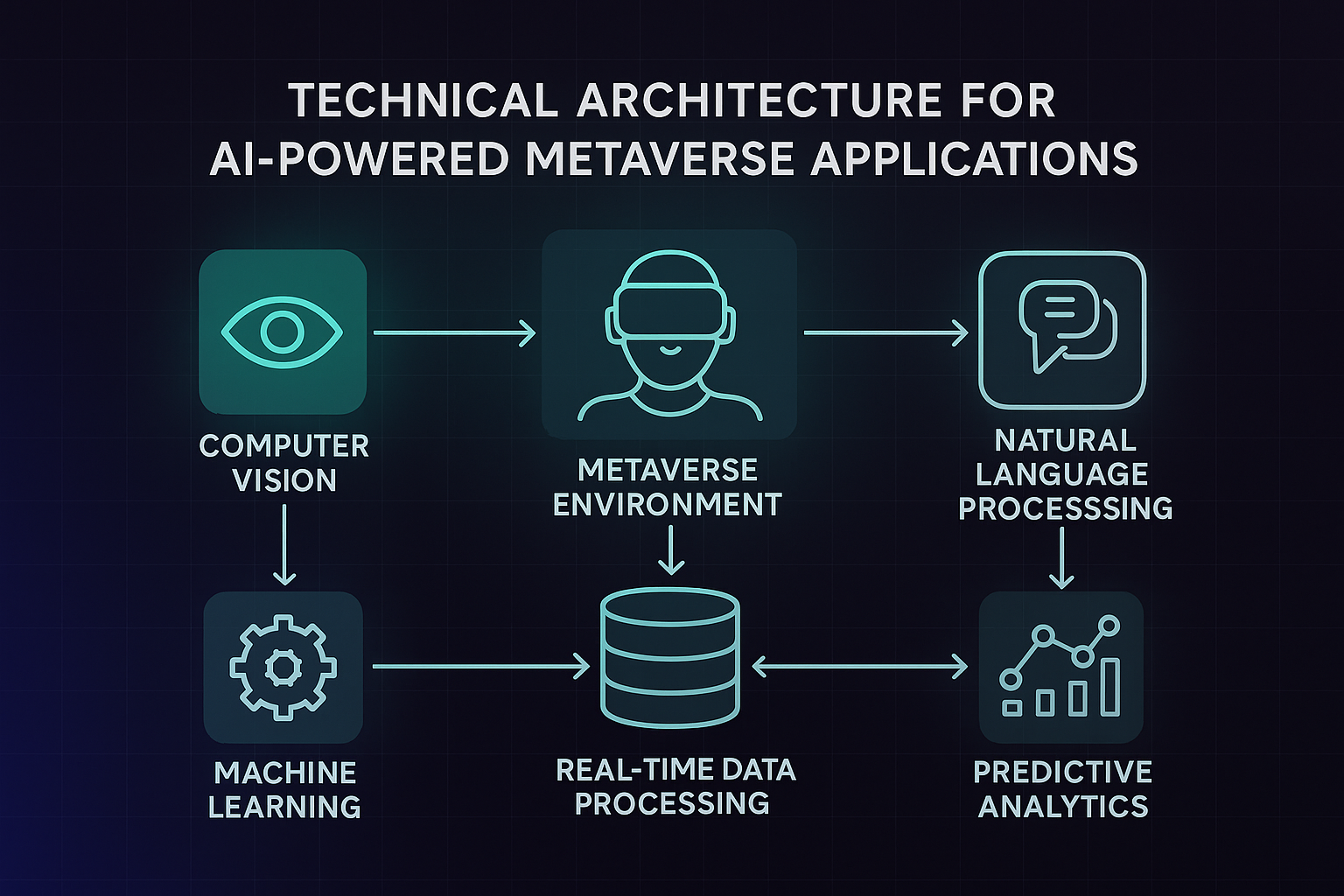Join our newsletter



The metaverse promises to revolutionize how we work, learn, and interact. Yet without artificial intelligence, these digital worlds remain static environments with limited potential for genuine transformation. While VR headsets capture media attention and virtual real estate generates headlines, the most significant developments happen through AI systems that bring intelligence to virtual environments. This intelligence transforms simple 3D spaces into adaptive, learning ecosystems.

The metaverse represents the convergence of virtual reality, augmented reality, and persistent digital spaces where users interact through avatars. Consider it the evolution of the internet from flat web pages to immersive, three-dimensional experiences.
As Mark Zuckerberg noted in his vision for Meta's transformation:
"In many ways, the metaverse is the ultimate expression of social technology."
This perspective captures why leading technology companies are investing billions in virtual environments, yet it also highlights why AI becomes essential to fulfill this promise.
The defining characteristic of truly effective metaverse applications lies in their ability to create digital experiences that respond dynamically to user needs. Current implementations demonstrate this potential across various sectors: Gaming platforms like Fortnite host virtual concerts attended by millions, while enterprise solutions such as Microsoft Mesh enable collaborative workspaces that transcend geographical boundaries. Medical training environments allow surgeons to practice complex procedures without risk, and industrial digital twins mirror real-world factory operations with remarkable precision.
Virtual worlds without AI capabilities face fundamental limitations that restrict their practical value. These environments typically offer identical experiences to all users, regardless of individual expertise levels or specific objectives. They remain static, unable to modify themselves based on changing conditions or user behavior patterns. User interactions within these spaces follow predetermined scripts, creating predictable exchanges that quickly become repetitive. The systems cannot extract meaningful insights from user activities or improve their performance over time. Most critically, they lack the autonomous decision-making capabilities necessary to provide contextual assistance when users encounter challenges.
Consider a virtual training facility that maintains the same difficulty level regardless of a learner's progress, or a digital twin that simply displays current conditions without predicting potential failures. These examples illustrate expensive simulations rather than intelligent learning environments.
AI transforms metaverse applications by introducing capabilities that make virtual environments genuinely responsive and valuable. The integration occurs across multiple layers of the virtual experience.
AI converts virtual training from passive content consumption to dynamic educational experiences. The technology creates personalized learning trajectories that adapt based on individual progress rates and learning preferences. Real-time performance analysis provides immediate feedback, while scenario generation algorithms create unlimited practice opportunities tailored to specific skill development needs.
Advanced assessment systems identify knowledge gaps and strengths, enabling targeted skill development. Organizations implementing these systems report accelerated learning timelines, with skill acquisition rates improving by 40-60% compared to traditional training methods. Knowledge retention rates show similar improvements, often exceeding 70% better performance in long-term assessments.
AI elevates digital twins beyond static representations to become predictive intelligence platforms. These systems continuously analyze sensor data to identify anomalies that precede equipment failures, often providing 2-3 weeks of warning. Optimization algorithms suggest operational improvements based on comprehensive data analysis, while scenario simulation capabilities allow testing of proposed changes before implementation.
Manufacturing facilities using AI-powered digital twins report dramatic reductions in unplanned downtime, often achieving 40-50% improvements. The predictive capabilities enable proactive maintenance scheduling that prevents costly production interruptions while optimizing resource allocation.
AI facilitates sophisticated human-machine collaboration within virtual workspaces. Context-aware assistance systems provide relevant support precisely when needed, without requiring explicit requests from users. Automated documentation capabilities capture meeting outcomes and decisions, while intelligent scheduling systems coordinate activities across multiple time zones and availability constraints.
Knowledge synthesis algorithms combine insights from multiple team members, identifying patterns and opportunities that might not be apparent to individual participants. These collaborative capabilities often result in more effective decision-making processes and improved project outcomes.
The implementation of AI within metaverse environments requires sophisticated technical architecture that integrates multiple specialized systems. Computer vision capabilities track user gestures, facial expressions, and spatial relationships with high precision. Natural language processing systems enable fluid conversation and accurate command interpretation. Machine learning models continuously analyze user behavior patterns to improve experience quality, while reinforcement learning algorithms optimize virtual environments through systematic experimentation. Predictive analytics systems anticipate user needs and system requirements, enabling proactive resource allocation and performance optimization.
These components work together through real-time data processing pipelines that ensure responsive user experiences while maintaining the continuous learning necessary for ongoing improvement.

| Business Area | Traditional Method | AI-Powered Metaverse | Improvement |
|---|---|---|---|
| Employee Training Time | 8-12 weeks average | 3-5 weeks average | 40-60% reduction |
| Knowledge Retention Rate | 45-55% after 6 months | 75-85% after 6 months | 70% improvement |
| Equipment Downtime | 15-20% unplanned downtime | 8-12% unplanned downtime | 40-50% reduction |
| Remote Collaboration Efficiency | 65-70% productivity vs in-person | 90-95% productivity vs in-person | 60% improvement |
| Customer Support Resolution | 24-48 hours average | 4-8 hours average | 75% faster resolution |
| Travel Cost Reduction | Baseline operational cost | 60-80% reduction | Significant cost savings |
Beyond immediate cost reductions, these implementations create competitive advantages through accelerated employee development and enhanced customer experiences. Virtual product demonstrations and immersive service interactions generate new revenue opportunities while reducing operational expenses associated with physical facilities and travel requirements.
Successful AI metaverse implementations typically follow a phased approach that begins with clearly defined business objectives and a thorough assessment of existing infrastructure capabilities. The initial phase focuses on identifying specific use cases where virtual environments can address current business challenges or create new opportunities.
Pilot implementations allow organizations to test AI-powered virtual experiences within controlled environments, gathering performance data and user feedback that inform broader deployment strategies. These pilots should include clear success metrics and mechanisms for continuous optimization based on real usage patterns.
Scaling successful pilots requires integration with existing business systems and ongoing refinement of AI models based on expanded user data. Organizations that maintain focus on measurable business outcomes while continuously optimizing their AI systems achieve the most significant long-term benefits from metaverse investments.
The convergence of AI and virtual environments creates opportunities for organizations to transform how they train employees, optimize operations, and engage with customers. Companies that understand and implement these capabilities effectively position themselves to capture significant competitive advantages as virtual experiences become increasingly central to business operations.
At Kenility, our experience building AI-powered applications for global enterprises provides deep insight into both the technical requirements and business implications of metaverse development. Our teams work directly with the machine learning frameworks, 3D engines, and integration challenges that define successful virtual environment projects.
Ready to explore intelligent virtual experiences for your organization? Contact our team at hello@kenility.com